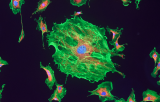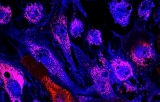
KTM2A probe for ISH CE/IVD - Acute myeloid leukemia (AML)
The KMT2A (lysine methyltransferase 2A, a.k.a. MLL) gene encodes a histone lysine N-methyltransferase and is involved in a variety of cellular processes, including hematopoiesis, DNA damage response, and cell cycle control. Translocations involving the KMT2A gene are identified in 5-6% of all acute myeloid leukemias (AML) and 5-10% of all acute lymphoblastic leukemias (ALL). The frequency of translocations involving the KMT2A gene is significantly higher in infants with AML (50%) as well as with ALL (80%). More than 30 fusion partners are documented for KMT2A, the most common translocations are t(4;11) and t(11;19) in ALL, and t(6;11), t(9;11), and t(11;19) in AML patients. Between 1-15% of cancer patients treated with DNA topoisomerase II inhibitor develop therapy-related leukemia (t-AML) associated with KMT2A translocations. Generally, the presence of KMT2A rearrangements in patients with acute leukemia indicates a less favorable prognosis. However, recent studies suggest that the specific KMT2A translocation partner may influence response to therapy and overall prognosis depending on the clinical context. Hence, detection of KMT2A translocations by Fluorescence in situ Hybridization may be of diagnostic and prognostic relevance.
Search result : 0 product found
Refine your search :
RUOCE / IVD
Cat#
Description
Cond.
Price Bef. VAT
‹
›


